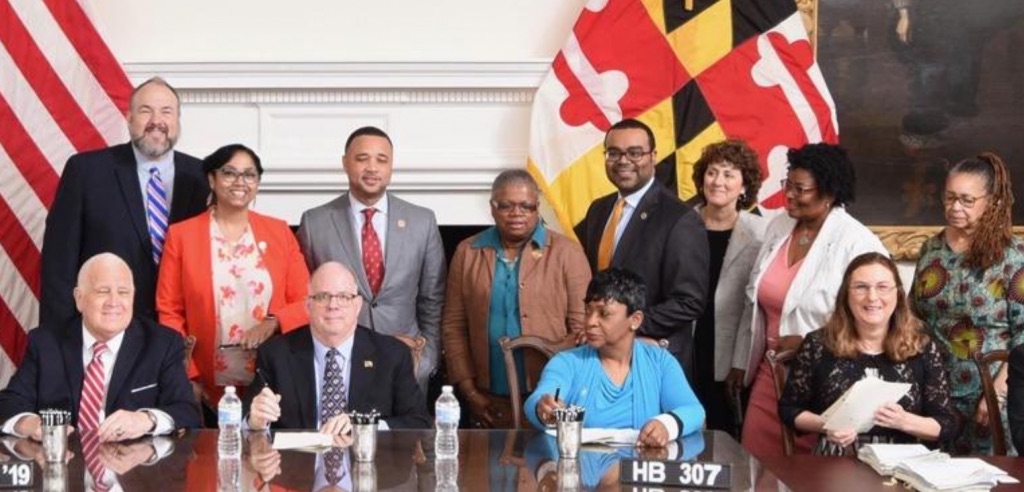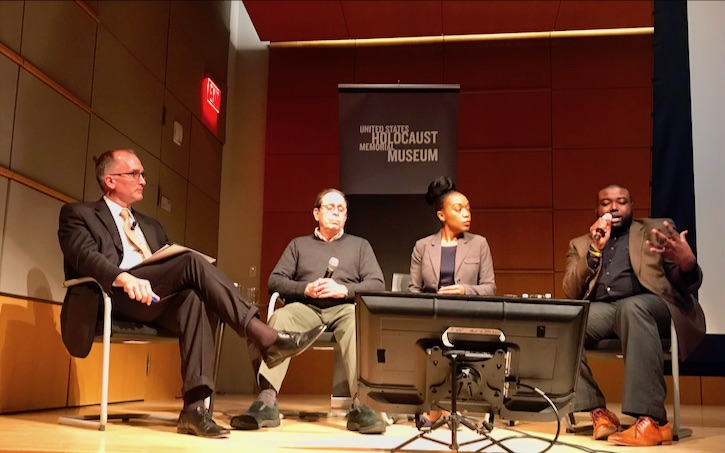Oral History Lab
JMJP has partnered with other sponsors to establish the Maryland Lynching Truth, Racial Healing and Transformation Oral History Initiative.
The Initiative provides local county coalitions throughout the state with comprehensive oral history resources needed to conduct interviews with the descendants and relatives of racial terror lynching victims and perpetrators, historians, activists, politicians, and other community members. It will be up to the local coalitions to determine their list of potential interviewees.
The Moment and the Obligation
A historic racial reckoning is underway in the United States. The racial injustices from the past and the policies and practices that sustain systemic racism today led to dangerous levels of societal and political division, hate, fear, and pain. As sponsors of this initiative, we believe the time has come to heal racial divisions in the United States and build a racially equitable society that will endure.
Our charge is aptly summarized by Dr. Gail Christopher:
“Healing is about utilizing the authentic stories of individuals to help understand and embrace our common humanity, to remind each of us of our humanity and the power we have to generate change, and to welcome our role in going beyond winning individual struggles for change to changing the structures, systems, policies, and practices that divide us.”
Until the voices and lived experiences of Black Marylanders are centered, Maryland’s lynching history will remain only a half-truth. Uncounted women, men, and children who lived through anti-Black violence and its aftermath have been strategically silenced by the same systems that undergirded the lynching regime. This initiative will realize a community-driven vision for narrative change and restorative justice, amplifying and archiving the testimony of those who mourned, organized, persisted, and resisted in the face of racial violence.
Background

Governor Larry Hogan signs HB 307 into law. (Maryland Lynching Memorial Project)
In 2019, the Maryland General Assembly enacted, and Governor Larry Hogan signed into law, legislation establishing the Maryland Lynching Truth and Reconciliation Commission as the first Commission dedicated to investigating racial terror lynching in the United States. Sponsored by Delegate Joseline A. Peña-Melnyk, (2019) House Bill 307 tasks the Commission with researching the more than 40 documented racial terror lynching that took place in the state of Maryland between 1854 and 1933, holding public hearings in communities where racial terror lynching took place, and developing recommendations for addressing the legacy of lynching that are rooted in restorative justice. Recently, the Commission was awarded $300,000 through the U.S. Department of Justice’s Emmett Till Cold Case Investigation Program to fund its work.
Who will conduct the interviews?
The interviews will be co-facilitated by one or more co-faciltator(s) of the specific local coalition and by a pre-assigned historian trained in oral history theory and practice. It will be up to the local coalitions to determine which member(s) of their organization they would like to serve as co-facilitator(s). Trained historians will develop a list of proposed questions for each specific interviewee category, including: (1) Descendants/Relatives of lynching victim, accuser, or perpetrator (2) Researchers (3) Activists/Community Members.
Each county coalition should review and complete an intake form, linked here.
Will the interviews be in person?
Due to the nature of the COVID-19 crisis and potential issues with travel, we have decided that conducting virtual interviews will be our default, using cutting-edge oral history software called TheirStory. We are happy to make adjustments should the interviewer and interviewee mutually agree to interview in-person, or should an interviewee require a technology proficiency accommodation, such as conducting a phone interview.
When are the interviews scheduled?
To support coalitions as they prepare for the Maryland Lynching Truth and Reconciliation Commission’s local hearings, oral history interviews will be scheduled approximately one to two months before the hearing date for each designated county or region. These will be scheduled on Saturdays and Sundays between 10am – 5pm ET.
Interviewees will be asked to follow the schedule below, selecting interview times from the days assigned to their respective county or region.
What about historical and psychosocial trauma?
Due to this work’s sensitive nature and the realities of historical trauma, counseling services will be provided to interviewees and interviewers as needed. Counselors with trauma-informed and cultural responsiveness training will be available virtually before, during, and after oral history interviews.
We are partnering with several institutions—such as Morgan State University and the University of Maryland—to establish a network of social workers including advanced candidacy Masters of Social Work (MSW) students as well as supervisory licensed/certified social workers in the state of Maryland. Volunteer MSWs: see below to sign up for 3-hour shifts.
Interviewees and interviewers will have access to social worker support according to the proposed schedule below:
| Week Prior to Interview: | During Interview: | Week Following: |
|
Mon, Wed, Fri 5-8pm ET |
Sat & Sun 10am-5pm ET |
Mon, Wed, Fri 5-8pm ET |
What Happens to the Oral History Interviews?
Audio/video files, edited transcripts, and other finished materials will be shared with participants and each county coalition before they are published. The oral histories will also be deposited into the archival repositories of the Maryland State Archives and Maryland’s Four Historically Black Colleges and Universities, including Bowie State University, Morgan State University, Coppin State University, and the University of Maryland Eastern Shore. Interviewees and county coalitions are welcome to suggest additional archival repositories for their materials.
Other questions:
Please direct other questions to: mdlynchingsoralhistory@gmail.com
What is TheirStory?
TheirStory (theirstory.io) has grown into a leading platform for conducting oral history interviews, sponsored by the Oral History Association and other like-minded public history organizations. It is a video conferencing platform much like Zoom, with the addition of transcription, indexing, and archival features. It also affords us flexibility to make the interview process as accommodating as possible. TheirStory interviews can be conducted in several formats:
- A live interview between an interviewee and an interviewer in real-time
- An asynchronous interview without an interviewer present, allowing interviewees to answer guided questions on their own time, in one or multiple sessions
- An in-person interview that meets current COVID-19 guidance from the CDC
- A phone interview or other technology proficiency accommodation

The interviews will be recorded digitally via TheirStory, and participants will be provided with digital copies of the final transcripts and a CD or digital file of the audio/video recording. As per the Oral History Association’s guidelines, all interviewees retain the right to review and edit their interview transcript before the final version is deposited and, if they wish, to place restrictions on the availability of the interview.
Proposed interview schedule:
| Aug-Sept | October | November | December | Jan 2022 | |
| St. Mary’s Co. | Week of Aug. 16/23 (TBD) | — | — | — | — |
| Calvert Co. | Sept. 4, 5, 11, 12 | — | — | — | — |
| Alleghany Co. | Sept. 11 & 12 (mostly in-person) | — | — | — | — |
| Anne Arundel Co. | Sept. 18, 19, 25, 26 | — | — | — | — |
| Carroll & Frederick Co. | — | Oct. 9, 10, 16, 17 | — | — | — |
| Prince George’s Co. | — | Oct. 30 & 31 | — | — | — |
| Montgomery & Howard Co. | — | — | Nov. 13, 14, 20, 21 | — | — |
| Caroline, Kent, & Queen Anne’s Co. | — | — | — | Dec. 4, 5, 11, 12 | — |
| Baltimore, Harford, & Cecil Co. | — | — | — | — | Jan. 8 & 9 |
| Wicomico & Worcester Co. | — | — | — | — | Jan. 15 & 16 |
| Somerset Co. | — | — | — | — | Jan. 22 & 23 |
Next steps to participate:
County Coalitions:
- Please review and complete the intake form as soon as possible.
- Begin completing the Step-by-Step Workflow.
Interviewees:
- They will fill out an intake form.
- They will need to schedule their interview according to the dates available to their county (see schedule above): mdlynchingsoralhistory.youcanbook.me
Volunteer Social Workers:
- Sign up for M/W/F evening shifts at: weekdaysocialworkers.youcanbook.me
- Sign up for Sat/Sun shifts at: weekendsocialworkers.youcanbook.me


